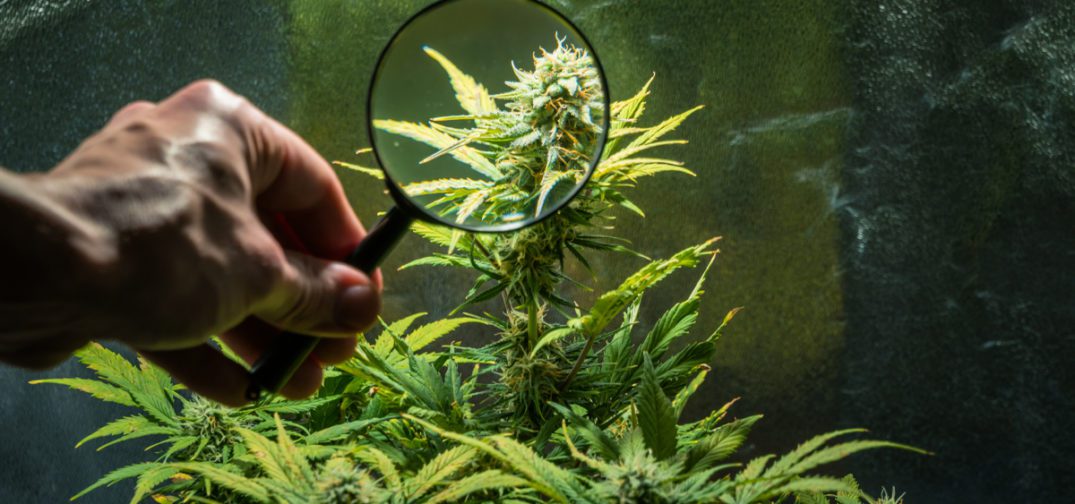As cannabis reforms become more and more widespread, the traditional tourism industry has unfortunately been slow to accept the cannabis community. Even in Humboldt County, California — which is world-famous for its expert cannabis cultivators and cannabis-friendly climate — travelers can find it difficult to legally appreciate the region’s most archetypal crop.
In our latest podcast episode, our host TG Branfalt interviews Jon O’Connor and Amy Cirincione O’Connor, who co-founded Humboldt Social earlier this year on a mission to deliver cannabis-friendly lodging, dining, and event opportunities. This podcast episode covers their company launch, the latest cannabis tourism trends as society emerges from COVID-19 restrictions, California’s limited opportunities for social use, and more!
Tune in to the interview via the media player below or scroll further down to find a full transcript of the podcast.
Listen to the podcast:
Read the transcript:
Commercial: This episode of the Ganjapreneur Podcast is made possible by AROYA, a comprehensive cannabis production platform for commercial growers. If you are a commercial cannabis grower, you can use AROYA to level your production workflow. featuring a combination of precision instruments and powerful software that help you intelligently cultivate, dry and process cannabis. The AROYA cannabis production platform is your ticket to greater yields and consistent quality. Request a quote today online at aroya.io. That’s A-R-O-Y-A.io.
Cara Wietstock: Hi, I’m Cara Wietstock, culture editor at Ganjapreneur and host our YouTube show Fresh Cut. The best way to understand cannabis business is to speak directly to those who work within it and Fresh Cut was created to shine recognition on the people who fill these roles. In this interview series, we focus on those with their hands and the dirt, both literally and figuratively. From cultivators to bud tenders, educators to advocates, activists to lobbyists. We aim to illuminate the workers who keep this industry thriving. Enjoy one-on-one conversations with me and guests by watching along on the Ganjapreneur YouTube channel and follow our social channels to keep up with the latest episodes. Have a great day.
TG Branfalt: Hey, there, I’m your host TG Branfalt and thank you for listening to the Ganjapreneur.com Podcast, where we try to bring you actionable information and normalize cannabis through the stories of ganjapreneurs, activists, and industry stakeholders. Today, I’m joined by Jon O’Connor and Amy Cirincione O’Connor, founders of Humboldt Social, a California hospitality and wellness brand that is incorporating cannabis into its current business model. Jon has been a founding COO and board member of Dosist, a globally recognized cannabis wellness company, and is a member of the founding team of cannabis wellness brand, Papa & Barkley. How are you doing this afternoon, Jon and Amy?
Jon O’Connor: We’re doing great.
Amy Cirincione O’Connor: Doing great. Thank you.
TG Branfalt: So, before we get sort of in the details of this really, really, really cool project you guys have going on tell me about yourselves and tell me about Humboldt Social.
Amy Cirincione O’Connor: Let’s see, I am a licensed clinical social worker who came into this industry, I think accidentally. I would think as Jon and I got together and started kind of planning out our future, realizing that the path of AirBnb and investing in properties that could also be revenue streams for us would give us so much flexibility in terms of our life, right. It would give us opportunities to travel and to just see the world in a really different way, and maybe not be locked into a 9:00 to 5:00 job for the rest of our lives.
TG Branfalt: Who wants that?
Amy Cirincione O’Connor: Exactly. And so that was really the sort of axy. I think we were just thinking, we would just dip our toes into hospitality by renting out a spot that we owned and living out of backpacks for a while, and then we’ve just sort of grown and grown and grown. And for us, I think integrating cannabis came in just seeing a real lack of integration and recognition of cannabis, not just the plant, but also the community within the hospitality industry. We just so much of a, especially in an area like Humboldt where cannabis and tourism are really the twin drivers of the economic engine up here, for us it just felt really natural and kind of obvious to join them together. And so, I don’t… unlike Jon, I don’t have any formal business background, but like I said, it’s kind of obvious. I think some of the things that need to get done and so just been learning along the way.
TG Branfalt: And how about you, Jon? Tell me about how you came into all of this.
Jon O’Connor: Yeah, well, look, I’ve been in Humboldt County for about 21 years now. I came here after college and the interesting thing is I’m still not local, after being here for over half my life. But I’ve very much appreciated the culture and the people. I started out doing tourism, so I ran zip lines. I was a river guide, all sort of surrounded redwoods in Humboldt. And after we sort of continued to build that business, Amy and I started doing vacation rentals and then we started opening some bars. We opened up an oyster bar. And then we kind of realized that not everyone needs to go zip lining or river rafting, but everyone needs to sleep.
So lodging was a little bit more effective for us on the sales front. And then we also realized everyone needs to eat. But then even after that, everyone has vices. So after opening up some bars and connecting people with adult beverages, started looking at cannabis. I was introduced to cannabis as a profession about six years ago when one of the ex mayors of Arcata, which is kind of in the center of Humboldt County, introduced me to a farmer and broker and said, hey, this guy wants to do a cannabis tourism center. You might be a good connection to help him out. Very shortly thereafter, we started meeting with some investors in the Bay Area, and before we knew it, Dosist was launched. We had a marketing firm out of the East Coast.
They came in as a partner and then boom, it exploded, and then the founders started taking each other out and then I resigned. And just as I was resigning, Papa & Barkley was launching and needed a home for manufacturing. So we connected with the founder who’s Amy’s second cousin, who dropped a bunch of money in our bank account and we started finding manufacturing spaces and got one of the first licenses in Eureka to do manufacturing for Papa & Barkley. And then kind of speed forward a couple years now to the pandemic, we got so busy with our careers and lives, we either needed to grow our hospitality business because we have a couple hotels and bars and restaurants, so we needed to sell it. And we wanted to lean into cannabis and hospitality and do it together.
Humboldt County is… there’s 15,000 cannabis farms in Humboldt County. There’s 4,000 wineries in California. So we have almost four times, three to four times as many cannabis farms as we do wineries. And the California wine industry produces 80% of the wine that the nation consumes, but there’s only two to 3000 licensed cannabis farms in Humboldt. So the rest are traditional market. So it’s interesting that even the hotels in Humboldt County don’t lean into cannabis. So our mission is to normalize cannabis and hospitality. We’re doing that by bringing people into our hotels and you can go straight and go to the restaurant, go right to the bar or turn left and have a consumption experience in the hotels.
We’ve also partnered with Papa & Barkley where we’re creating sort of immersive hospitality and cannabis experiences. So you walk in and there’s a gift shop, a wellness shop that’s unlicensed. So you can get everything from CBD products to wellness products in the very start, of the very beginning of the dispensary. You go in and you get that licensed experience and you go outside and there’s a full food truck and outdoor restaurant. You go a little bit farther back, and there’s a consumption lounge where you can consume. And then if you want a medicated activated massage, you can… There’s one or two massage therapists that are there every day, doing cannabis infused massages, or CBD infused massages, you can choose.
TG Branfalt: So you’ve built heaven.
Jon O’Connor: We’ve built what everyone assumes is in Humboldt County. So what’s interesting about hotels in Napa Valley and Sonoma is you don’t walk into the hotel and there’s not pictures of wine all over the place. You walk into the hotel and it’s just normal hotel. It’s just in the center of all this cool wine experience and they have wine as well. So we are creating really cool boutique hotel experiences and cool restaurants and acknowledging that we’re in the center of the cannabis universe with 15,000 farms.
TG Branfalt: So tell me about… I mean, I can’t describe to you how much I really want to go there right now, as it snows in upstate New York, but what are California’s social use policies? I mean, when I go to, or when I was able to go to Montreal pre-pandemic, you could buy cannabis, no smoking in the hotels. You could smoke in public places, so long as you’re not near school. So we did a lot of smoking in the parks and in the street, but what are California’s policies?
Jon O’Connor: So let me tell you how New York is doing it right and then I’ll tell you how California’s done it wrong. So New York right off the bat on day one, they decriminalized it. So you can walk down the street in New York, even at Central Park, you can light up and you can smoke. Anywhere that you can legally smoke cigarettes, you can smoke cannabis. Beautiful, simple. They’re also expunging people’s criminal records. They’re really trying to do it well. What California did is they didn’t figure out consumption. So what that means is for people that don’t own their own home, there is nowhere for them to legally smoke. You can’t smoke in your car, you can’t smoke in public and you can’t smoke in a building that doesn’t expressly allow it.
So that leaves visitors to Humboldt County in the region that produces more cannabis per square acre than anywhere else in the world. You can legally go into a dispensary and buy it, but then if you ask a police officer or anyone in the state, what to do with it, they say, well, smoke it legally. Where can you smoke it legally? In a private residence that you own that you’re allowed to do it? So there’s a couple loopholes here. One, the state has said, hey, whatever local jurisdictions say about consumption, you can do. So that’s where we’re working with Papa & Barkley. We created a consumption lounge, totally legal.
We’ll give the people the opportunity to consume both edibles, beverages and smoke, and smoke cannabis onsite, totally legal. We just have to encourage them to have designated drivers or encourage them to take Ubers or taxis or something like that. So that’s what we’re doing there. At our hotels, we are working it out with the regulators right now. So you’re legally allowed to smoke on private property in areas that’s not available to the general public. So we’re working with that very specific rule to solve it. Right now, you can have cannabis delivered to any hotel in California.
Some hotels are encouraging that by putting menus on the bedside tables, other hotels are not. So we are working within the existing rules and framework to solve it. That said, we’re not building a bud and breakfast or cannabis hotel. We’re just acknowledging that this is a powerful plant. It’s about two thirds of our economy in Humboldt County and there’s 15,000 farms. So why wouldn’t you be leaning into this in the same way that businesses in Napa and Sonoma has created their whole world around the wine industry.
TG Branfalt: So one of the things that you guys are in the process of doing is opening these… you’re opening dispensaries. Can you tell me about sort of the challenges in opening dispensaries as opposed to the model that you have now, the hospitality model?
Jon O’Connor: Yeah. So my job for Papa & Barkley was real estate and compliance. So what I did for the company is I found them real estate. I got building permits. I licensed the real estate for cannabis activities and then I… that I opened them up. So as I was starting to exit Papa & Barkley and start to build Humboldt Social, or continue to build it and scale it, I already had gotten two dispensary licenses for the company. So I approached the company and said, hey, these are underutilized resources, what if I utilize these licenses, manage them for you, give you a percentage of sales and turn them on. Here’s the ideas, here are the concepts. Eight months later, we had not active agreement, started rolling.
And so that part was easy, but that’s also because that’s what I did for my job. So I did renovated buildings, worked with contractors, got permits and then worked with the different regulatory authorities. So in California you have to get local jurisdiction to approve your cannabis permit first, and then the state will approve it second. So what that means is if anyone wants to do business in California, you find a city or a county that has loose or easy regulations or permits, and there still are cities and counties that you could walk up, pay five to $15,000 and get a permit and then money to the state and also get a permit. There’s no wait in line. There’s no lotteries. There’s other cities where you gotta do a lottery. They’ve limited it. But California is still a place where if you go to these small jurisdictions or small cities or counties, you can still get a license.
So for us, that part was easy. And in Humboldt County, our plan is proof of concept this year. So it’s about making it easy for the cannabis consumer and new cannabis consumer to learn about cannabis, buy cannabis, and consume cannabis, whether it’s on our properties, adjacent to our properties, or at these dispensaries that we’re working on. And then next year’s all gonna be about scaling and going to other locations and grow in the business.
TG Branfalt: And Amy, you’re an educator and Jon just brought up education. How important is that to you, to have this element within your model?
Amy Cirincione O’Connor: Oh, so important. I mean, I think we love our cannaseurs. We love the folks that are coming to Humboldt explicitly to experience the variety of the cannabis products that we have, the different strains, the different farms, the sun grown versus indoor. And those are always fun customers to have, but what we’ve experienced being in partnership with Papa & Barkley is that many consumers are super new to cannabis as a whole, right? So one of the things that we experienced with Papa & Barkley when Jon first started working there was we would have these contractors on site, right, doing construction. And these are old Humboldt guys, right? These are old mill workers. These are contractors, these are old loggers. They would never smoke a joint, right. This is not what they’re going to do, but they have chronic pain.
They’ve been working, their bodies have been their tools for so long and so is out there with the patches, right? He’s like giving them patches, he’s giving them cream. And then now we have these 56 year old men who would never be a druggie, right, but they are loving the relief that they’re getting. And it’s also, it’s introducing them to the healing properties and reducing the stigma of key cannabis. And so that’s a huge… That’s definitely a market for us, is folks that are coming. Maybe they’re just seniors on their RV trip, right? And they’re coming through the redwoods and they’re going to stop at a place like Papa & Barkley Social. And it’s not this narrow, dark windowless space with huge neon green Buddhas outside, that’s clear. That sends a message that this is not for you, right?
Whereas Papa & Barkley social is going be this… is an inviting light filled, warm, beautifully designed space that’s for anybody. So I think that’s one really powerful piece of education. And I think for me personally, right, I’m a mom, I’m a teacher, I’m a professional. And I have been realizing in the last few years that even as a bar owner, alcohol is not really a super healthy component of my life, right. I’m getting older. I have a couple drinks, I wake then up the next morning and I feel it, right? I see it in my skin. I feel the hangover. I’m moody, Jon can attest to that in the morning, right? So I’m trying to figure out, okay, well, what is my… how is my lifestyle?
How am I still going to find relaxation? How am I going to socialize while also trying to shift the role that alcohol plays? And for me, that’s all been about exploring in a different way, my relationship with cannabis. And when I was younger and I was consuming cannabis, it was like, get as blazed as possible. This is amazing, right. It was a huge part of my identity. And now that my life is fuller, and I live in cannabis country where I’m actually like an educated consumer, I’m realizing that micro-day-dosing is amazing, right. Being at the river here all day with a couple beers is one thing, but being out like having half a gummy and being on the river is like, in my mind, a peak Humboldt experience, like everyone should have it.
And so that’s really exciting for me, is having folks come in that are… Can learn all of the different ways that they can experience cannabis to elevate whatever experiences. They’re looking for. They’re looking for relaxation. Are they looking to go on an amazing hike and just maybe be more tuned in? Are they looking to get physical relief? Are they looking to socialize, right? And teaching them all the different ways that cannabis can be a part of that experience.
TG Branfalt: And what kind of people are, are you seeing most often? I mean in Massachusetts, when I go to a dispensary, the predominant age group are people my parents’ age and they’re 50s and 60s. And with legalization that occurred just the other day in New York, the secretary at my job, the administrative assistant, she said, well, I think I’m going to try it now. And this is a 62-year-old woman that had never, in our conversations previously, had never said, hey, could I get a gummy. Because she knows I’ve got them in my pocket, right. So what is the people that you’re seeing experience your experiences.
Amy Cirincione O’Connor: Yeah. So I would say so we, in our branding and brainstorming, we created this archetype of Hannah. This is our customer profile, right.
TG Branfalt: How interesting.
Amy Cirincione O’Connor: And I’ll just say, it’s not a lie that Hannah’s like loosely based on me, right Jon? Right?
Jon O’Connor: There are a variety of Hannahs and you were one of them. We had some consultants stay with us at the beginning of COVID and there was also another, I think Jewish social worker that was also named Hannah. So you were a… who also consumed cannabis. But yeah, no, you should definitely talk more about Hannah.
TG Branfalt: I want to talk all about… I want to know everything about Hannah.
Amy Cirincione O’Connor: Hannah is dope, first of all, you want to hang out with Hannah. So Hannah in many ways is really inspired by some of the customer profiles that we see in our hospitality business, right? So we see that the majority of the folks that are booking our rooms are working professionals. Are professional women working. They’re not necessarily… They could be traveling in groups. They could be traveling with a partner, they could be traveling with their families, but they’re really the ones that are driving the travel vacation planning for their families or their groups, right. They’re super media, social media savvy. They know what they’re looking for and they rely on social media, but also print media to looking for experience that really are going to efficiently and effectively deliver what they’re looking for, right?
These are working women, typically I would say age like late twenties all the way up until late fifties. And they don’t have a lot of time, right? And so when they’re… Even if they’re planning a two-week road trip, they’re trying to do get the most out of every day, right. And these are folks that are… They’ve got their tagged posts on Instagram, they’ve got their Pinterest albums and they’re also, when they’re traveling through a region like Humboldt, they’re also talking to… They’re talking to their bartenders and their wait staff and even the folks at the grocery stores asking recommendations. And so, those are the folks that come and stay with us over and over again, they’re the ones that find us through other posts on social media. Someone posts a great experience that they have with us and then their friends come and visit.
And they’re very conscious consumers. And so when we looked at that customer base hospitality, it felt like a really natural segue into the cannabis elements of the business, right? These are folks, women that yes, they’re absolutely looking to relax with the other responsibilities and they got a lot that they want to get done in the there travels in Humboldt. And so being able to find… make really specific, targeted recommendations of products that can pair well with the travel experiences that they’ve already planned and that can really maximize, I think, whatever their goals are in terms of states, right, but also will… But also have nice packaging and have a well curated social media presence because they’re looking for products that aren’t just fun to consume, but also they’re looking for sustainability. They’re looking for social responsibility and they’re looking for cuteness.
Jon O’Connor: And TG, Hannah haunts me because as we are building this business, it’s all about Hannah. So as we are building who’s going to be our partner for the massage space and what amenities do we need to support? And Hannah’s fancy and she likes her nice things. So like we had to buy a $40,000 honey wagon bathroom for Hannah but I think it’s been really important for us because like Hannah’s is design forward. And I also want to convert Hannah. So there’s going to be Hannahs that are daily smokers or daily consumers of cannabis. There’s a lot of them. But there’s also going to be Hannahs that show up for the massage or up for our outdoor restaurant, because it’s on Yelp and or because they did an Uber Eats pickup and they’re going to arrive at this location and they’re going to be surprised that, oh, they can walk right into this dispensary and where other dispensaries have armed security guards, while we have security guards sort of behind the scenes, watching the cameras, we also have our staff welcoming Hannah at the front desk offering every Hannah and their plus ones a warm towel to enter the space. Instead of welcoming them with a gun and a badge, we’re welcoming them with a warm towel and a inviting environment, surrounded by plants and in a comfortable setting.
TG Branfalt: Jon, is there also a lot of crossover? I mean, you started this sort of outdoor adventure in that sort of space. Is there a lot of crossover with those customers or that sort of population with your experiences?
Jon O’Connor: I mean, I think it is. I mean, I was very much in the adventure industry and business as a lifestyle. I loved being on the rivers. I loved being up in the redwood trees and as I got married and as we had kids, I very much recognized that the lifestyle wasn’t the only things. And creating college funds for our kids and having savings and buying a house. And all of those other things were also important as lifestyle. So those customers very much varied and some of them were Hannahs with their families and some of them were Hannahs with their girlfriends, but it was very much a shotgun approach to customers in the outdoors. So the customer service is the same, whether you’re dealing with a Hannah and the outdoors or you’re dealing with them in a hospitality setting, but everyone’s got to sleep, everyone’s gotta eat and everyone has their vices. And those tend to make a little bit more money and are more sustainable as a business than, than just pure sort of adrenaline or a serene experience in the redwoods.
TG Branfalt: I have to ask, has anyone shown up for one of your experiences, a massage or something, and been like, what, cannabis is involved, and just took off?
Jon O’Connor: So we are just launching on 4/20. So while we have had an existing hospitality business for the last eight or nine years, we are just merging it with cannabis this year. So we’re just we’re halfway through our fundraising round. So anyone out there that loves this idea, hit us up. But we’ve had a lot of people that have been shocked, especially with Papa & Barkley’s hero product, their Balm, because it’s a product that doesn’t get you high but it’s also a product that has a tremendous amount of efficacious properties where it’s both a pain reliever and an anti-inflammatory. So giving it to people that have never tried cannabis before, it’s the perfect sort of first product.
And then they can get in tinctures and pre-rolls and vape pens and sort of… And even beverages now. So we are about to merge and give this business a real go starting 4/20 at Papa & Barkley Social in the Old Kmart in Eureka, in the center of Humboldt County.
TG Branfalt: Well, you mentioned the beverages and beverages is my favorite I think sort of product, because I don’t drink alcohol really. And so when I’m with friends and especially in Michigan, when I could get THC-infused root beer, I mean, it was fantastic. I could sit around and feel like I’m having a drink with friends, which hasn’t happened for me in a very long time. And then you guys also own a bar, right. And so what role do you guys think that that beverages or what segment of the market do you think beverages are eventually going to be in the cannabis space?
Jon O’Connor: Yeah, so beverages are exploding and we are creating our own beverage line. So we’ve got a subbrand called Social Nature that we’re building. It’s basically like our house brand for our dispensaries and it’ll be the core products that you can get delivered to our hotels. But we’re leaning into beverages because of what you just said, TG, is it’s just that focus on the social experience. So what we’re trying to build is the social experiences that people have experienced in hospitality and transition it to cannabis. So at Papa & Barkley Social, you can get a normal sparkling water.
You can get a Spiked Seltzer or you can get a CBD-based drink like Recess, and you can consume any of those three. And you can sit at the outdoor restaurant or you can sit in the consumption lounge and have that same social experience. But our goal is to normalize those experiences and basically do exactly what you said you liked, of having that social experience without having to drink alcohol.
TG Branfalt: For you, Amy, you said that alcohol is sort of being disengaged from your life or something of that effect. What’s your take on beverages?
Amy Cirincione O’Connor: I think they’re so exciting because I think it’s an amazing replacement activity, right? So we all know that it’s not just like the chemical composition of alcohol that’s addictive, right, it’s also the ritual of it and the process. So I think it’s every… A lot of us who have a relationship with alcohol, it’s not just the sensation of drinking, right, or even the onset of getting buzzed or even drunk. It’s like the whole thing, right? It’s the social experience, or it’s the sensation of having like a cold can in your hand or the fizziness and all those things. And I think that CBD and THC activated beverages are just a phenomenal way of replacing so many components of that ritual with something that’s healthier. And I think, I also just think like kind of method of delivery-wise, the way that there is so many ways that you can experience the high, right? You can just like, when you smoke, it hits real quick, and then often there’s also the side effects of sometimes dry eyes or dry throat that come with that.
And then there’s edibles, but then you’re waiting around, right. And some of us have had the experience of having an edible, forgetting about it, and then suddenly you’re like, wait, what is happening right now? Right. But my experience, and I think the folks that I know that are regular consumers of CBD or THC drinks, it’s a fairly similar onset process to drinking a beer, right, or drinking a Seltzer. I think that’s also a key thing is that owning a bar and seeing the way that seltzers, hard seltzers, have taken off and is that’s such a comparable consumption experience to some of these the can beverages.
And so I’m really excited to see that, to be able to provide those. And I’m also excited eventually to have more of a mocktail experience and playing with non-THC, non-CBD tincture, but also some that are, and just really focusing on all the therapeutic that properties that come with honestly hydrating, right, which is what should we all should be doing. And you can have that experience and have it taste good and have it feel good and not end up drunk or hung over I think.
TG Branfalt: Is that something that you offer in the consumption lounges, is sort of mixed mocktails made with cannabis or is that something that is being considered widely. Are we going to see sort of cannabis bars?
Jon O’Connor: We are absolutely going lean into that in phase two. So for our launch right now at 4/20, we already are doing four big things. So you’re coming in, you have a non-cannabis retail experience in the front because in California, you can’t even buy a t-shirt in a dispensary without getting it approved by the state of California. So for us to have an unlicensed space in the front, just gives us a lot of flexibility because cannabis dispensaries can’t even sell water. They are prohibited by the state. So we are sort of working within the rules and construct to have a separate entity in the front of the building that is using a separate point of sale system to sell whatever you want. And then you have the traditional dispensary and then the consumption lounge, and then the outdoor restaurant, and then the massage activity. So, our goal and when we launch is to integrate that experience, normalize it, and then absolutely add onto it.
So when COVID slows down, we’re very interested in leaning into events, when the world opens back up and absolutely building a a non-alcohol bar and I think people will be pretty excited for that.
TG Branfalt: So what do you guys think that your model will be able to teach others interested in incorporating cannabis into their existing hospitality or tourism business?
Jon O’Connor: I hope that people in Humboldt County who continue to lean into cannabis because it is surprising how much of a stigma cannabis still is. The local Visitor Bureau doesn’t even promote cannabis. I mean that’s how terrible the stigma still is, so.
TG Branfalt: Do you think they will eventually? I’m sorry to cut you off, but I mean, do you think that that’ll happen eventually?
Jon O’Connor: When all of these old fuckers die, excuse me.
Amy Cirincione O’Connor: Okay. Okay. So the marketing will change. I think it’s going be too late, right? By the time Humboldt is actively marketing, there, we’re going to be four counties behind. Mendocino is going to be there, Santa Barbara is going to be there. There are just so many more sophisticated, innovative marketing concepts coming out and it just going to be a real shame for Humboldt is out on it, because we are so well-positioned. We should be at the forefront and we’re not. And I think what I’ve seen here is a really powerful growers association that’s really been putting the pressure on our county and local authorities saying, this is what we need, our products are here. Our services are here, we are ready to provide these services. We just need you to put the message out there. And so, I think we, like a lot of these other growers, we are doing the messaging ourselves. Okay, thank you very much. We’d rather our tax dollars not go to you, but they do. And in the meantime, we’re just going to create our own budgets for these things.
TG Branfalt: I mean, it does seem just slightly ridiculous. I mean, I know Jon makes the joke, but I mean, it does seem slightly ridiculous that Humboldt is synonymous with cannabis. I’ve known about Humboldt County since I was 15 years old, and it’s because I was reading High Times and to talk about Humboldt branded products then. So I take your point very, very well. And what role do you guys think that cannabis is going to play in how people just book vacations generally? I mean just to, for example, I won’t go to any place on vacation that doesn’t have legalized cannabis, not going to. So am I sort of the hardheaded exception or what do you guys see in… from a hospitality perspective?
Jon O’Connor: Well, I think that hospitality is going to continue to slowly embrace cannabis. Our goal for our business is the normalization of it. So for part of the normalization to work is you need cannabis, heavy cannabis forward businesses doing things all around you. So for us to be cannabis, supportive cannabis, embracing, and hospitality connected, we need the bud and breakfasts, we need the smoke-filled, bong-filled rooms. Because there are serious cannaseurs that will only travel and will sort of create their life around that. We support that. However, our establishments we are really focusing on Hannah, and that’s who we’re building it out towards. So we hope our sort of next phase in 2022 and beyond is partnering with existing hospitality business is to bolt on Humboldt Social to that. And that’s after we prove our concept this year, that’s really where we’re going to go. So looking at those legal states or pre legal states to bolt on that infrastructure and show how hospitality and cannabis can come together.
Amy Cirincione O’Connor: Yeah. I think if we’re doing our job and we’re bringing our vision to fruition, we’re not going… We will cater to some guests who are cana-centric in their travel planning, but for many folks, it’s just going to be part of the experience. That’s what integration for us means, that you’re going to come and part of your… Yes, the Humboldt experience is our rivers. It’s our redwoods, it’s shopping. It’s the local food movement, it’s our makers and creative community and getting to meet those folks. It’s cannabis, it’s wine, it’s beer and spirits, like it’s all those things. And so I think I would like to see other, at the very east hotels using the word cannabis on their websites. That would be a huge win to just acknowledge that it’s here and know that they can do that and that doesn’t mean they got to… It doesn’t mean that their lobby needs to have cannabis air fresheners in it, so that that’s the forwards, what you smell when you first walk in.
It’s a part of what we do. I think that some of the stigma around it locally is that there’s a lot of folks here who believe that we need to fight against our reputation and our association with cannabis, and that’s limiting for us. I feel like in the last decade, that’s just really been proven to be incorrect. From a marketing perspective, that’s not the move. The move is toward it. The move is alongside it, not against it.
TG Branfalt: So in the last couple of minutes here, I mean, you both have these very diverse backgrounds and you’re both incredibly smart. But you are in the thick of building, something that I’ve never seen done before. So what advice do you guys have for entrepreneurs in this space?
Jon O’Connor: First advice is come visit us. We will share our limited knowledge for free. And then secondly, make a plan and start going for it because this is the time — the best ideas are built in depressions and at the bottom. So we’re currently in this interesting place with COVID and our economy, but also this massive explosion of cannabis and this weird hemp thing going on with CBD. And we personally think that’ll go away and cannabis will be… hemp and cannabis is the exact same thing. It’s just one has less THC and the other one has more THC. So, we think it’ll come around and if you embrace the plant and the culture is it’ll work.
TG Branfalt: What about you, Amy? What advice would you have for entrepreneurs?
Amy Cirincione O’Connor: So when we first, when we renovated our very first building, we had a very… Innovative is a nice way to say it. We had a very innovative vision for what we want to do with the building. We had no construction experience, no design experience. This was our very first purchase. And we had a very different idea for what we wanted to do. And we met with lots of reputable, contractors and engineers, and talked about what we wanted to do. And in the beginning, I was the one who was meeting all those folks on the job site. I was coming from my full-time job during lunch, my lunch breaks. I was meeting these folks and people would take one listen to me at the space, listen to me for about a minute and often just be like, no, that’s not possible.
Or, oh, that costs $300,000, or kind of pat me on the head, okay, little girl, goodbye. And I would come home and talk to Jon about it and be like, yeah, it’s just not possible. And Jon’s like, of course it’s possible. We just have to find… We just haven’t found the right person. We just haven’t found the right contractor. And he said, the goal is to get to the, yes. Keep on talking, keep on asking until you find the right person who, and their answer is going to be yes. And I think that that mantra has served us incredibly well through all of our businesses, because it is our… It is the rule, not the exception that people tell us that our ideas are terrible or that they’re going to fail, or that they’re impossible. That’s been our experience every single time.
And now I’m confident enough that people say that to me, I’m like, okay, so not with you, right? So you won’t be our customer, or you’re not going to be our contractor as opposed to doubting the integrity or the possibility of our ideas. And I think that that’s, if you want to be an innovator, especially in the cannabis space right now, just keep talking, just keep asking questions, keep finding the people and get to the yes.
TG Branfalt: I’ve done this podcast since I think 2016. I mean, some of the best advice that I’ve really ever heard. Thank you so much for sharing that with me. Where can people find out more about Humboldt Social and you guys?
Jon O’Connor: Yeah. So the best place to start is humboldt-social.com. And then that has sort of our family businesses on there, and they could stay with us tomorrow at humboldtbaysocialclub.com and stay at our current site. And then look for Scotia Lodge on June 15th and you can also, if you’re driving through Eureka, check out Papa & Barkley Social at the old Kmart on the way in the town.
TG Branfalt: I would love to talk to you about this Kmart if we had time, honestly. I love old repurposed buildings. In Burlington, Vermont, they just turned a Macy’s into a high school. I mean, it’s brilliant. So thank you guys so much for being on the show. I am very excited to see how this plays out and maybe at some point, get on a plane and go to Northern California spend a night in what sounds like heaven for somebody like me.
That’s Jon O’Connor and Amy Cirincione O’Connor founders of Humboldt Social, a California hospitality and wellness brand that is incorporating cannabis into its current business model. Thank you guys again so much for being on the show. It’s really been a pleasure.
Jon O’Connor: Thanks a lot TG.
Amy Cirincione O’Connor: Thanks TG.
TG Branfalt: You can find more episodes of the Ganjaprenuer.com podcast and podcast section of Ganjaentrepreneur.com on Spotify and in the Apple iTunes Store. On the Ganjaprenuer.com website, you’ll find the latest cannabis news and cannabis jobs updated daily along with transcripts of this podcast. You can also download the Ganjapreneur.com app in iTunes and Google Play. This episode was engineered by Trim Media House. I’ve been your host TG Branfalt.























